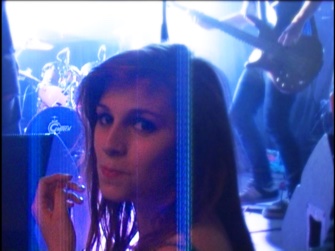
Émilie Brisavoine’s documentary Pauline s’Arrache (Oh La La Pauline!) initially reminded me of the kind of clip that might attract 30 views on YouTube, with the 15-year-old Pauline talking to the camera about the minutiae of a life that would seem to be of little interest to anyone apart from her family and her long-suffering boyfriend, who has to put up with more than a few of her tantrums. By focusing on the lives of her half-sister Pauline and other members of her family, however, Brisavoine has constructed a compelling narrative (presented from the beginning as a kind of fairytale) of a girl beginning to grow up and make sense of a family that is both typical – with its mundane squabbles – and weirdly unique.
Pauline’s mother, Meaud, is a former disco queen who met Pauline’s father Frédéric, eight years her junior, in a gay nightclub. Through a series of extracts from family videos, in which Frédéric dresses up in drag, usually as a bad Marilyn Monroe lookalike, we quickly realize that this is not your average nuclear family. Another clip from a TV daytime chat show reveals that Frédéric’s natural parents were only 11 and 15 years old respectively when he was born.
While Frédéric is often as irritatingly self-obsessed as his adolescent daughter, Meaud remains enigmatic. She has an inner sadness that seems at odds with her younger, party-animal self, but we are rarely allowed much insight into her past, as Pauline and Frédéric appear determined to dominate the camera.
Clearly Brisavoine was inspired by Jonathan Caouette’s astonishing 2003 documentary, Tarnation, which uses a similar range of film and sound footage to portray the mental disintegration of his mother. Pauline s’Arrache does not have the emotional impact of Caouette’s film, possibly because, for all the family’s distinctiveness, the problems that Pauline faces are nothing compared to the horror of Caouette’s experience.
Young Pauline’s growing pains are sometimes depicted with touching charm, and Pauline herself, for all her self-absorption, has a charismatic screen presence. Brisavoine makes judicious use of musical excerpts, not least Debussy’s achingly beautiful piano piece Clair de Lune, which managed to bring a tear to my eye on a couple of occasions.
Favorite
